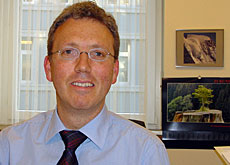security standards set european example

Switzerland's high security standards for financial safety could act as a role model for other European countries.
More than 3,000 Swiss companies have their assets regularly monitored by professional risk auditors and inspectors.
When it comes to insuring assets Switzerland is certainly at the forefront within Europe. Like banking or life insurance, insuring assets is one of Switzerland’s top-quality services.
The Swiss Institute of Safety and Security may not be so well known, but it is an important element in the insurance industry as it acts as the middleman between insurance companies and clients.
The institute was set up in 1945 and was first known as the “Institute of Fire Prevention for Industry and Businesses”. Almost ten years ago the institute took over the safety laboratories for chemistry in Basel – a move that enabled it to expand abroad as these laboratories receive orders from pharmaceutical
companies all over the world.
Big insurers normally pay the security firm a hefty fee to use their resources. In return, the insuring companies can count on the security firm’s expertise.
Risk levels
The company is a so-called competence centre and it deals with clients’ risk and security levels, a service the insurers use to monitor their clients’ risk propensity step by step.
Once the insurers have analysed the risk propensity of their clients they calculate the insurance premiums, which normally depend on the possibility of a company making an insurance claim.
The security firm’s clientele consists of 3,000 small, medium-sized and large companies, which insure their assets annually and have to obey the strict rules and regulations of the company.
The clients know that every three years the institute’s experts will audit their companies.
“Every three years, for example, our experts and a security officer of the bank in question examine all the buildings of the bank and check their condition,” the institute’s spokesperson, Matthias Wegmann, told swissinfo. “Swiss safety standards could act as a role model for other countries,” he said.
The European Commission is currently working on harmonising
safety standards for the European Union.
“The experts in Brussels will probably not look at Swiss standards, even though they could be better in places,” Wegmann said. This means that Swiss security firms will have no other choice than to adhere to European rules and regulations.
No expansion
Wegmann also said expanding beyond Europe would make little sense. “Every country has different standards and that would be too complicated. American hotel chains, for example, have to pay a horrendous security deposit, which is due to the high liability risk in the US.”
On the other hand there are countries that are happy with lower standards so as to stay financially attractive for foreign companies, which want to outsource production. The data collected by the firm is used as the base for the insurers’ policies.
“A company, whose building meets the highest safety standards does not need the most expensive insurance policy,” said Wegmann.
“Risk management and risk engineering for assets is very similar to illness prevention measures by life insurers. Prevention is not only better but also cheaper than a cure.”
swissinfo, Alexander Künzle
Three quarters of the SFr20 million of the institute’s revenue is generated by consultancy fees and conducting audits and inspections.
The company audits an average of 1,000 companies per year.
The institute’s clientele consists of service and administration companies (15 per cent), hospitals and homes (14 per cent), engineering firms (9 per cent), department stores and chemical companies (8 per cent each), hotels and restaurants (4 per cent), and watchmakers (3 per cent).
The safety institute is a Swiss competence centre for risk assessment and company safety.
As a non-profit organisation it is a partner of the insurance industry, the contracting companies and the authorities.
The institute’s expertise spans from risk management, fire and explosion prevention, disturbances, hazardous goods, operational safety and natural disasters.

In compliance with the JTI standards
More: SWI swissinfo.ch certified by the Journalism Trust Initiative
You can find an overview of ongoing debates with our journalists here. Please join us!
If you want to start a conversation about a topic raised in this article or want to report factual errors, email us at english@swissinfo.ch.